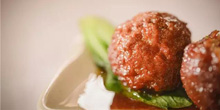Jinxi town, a place worth enjoying
(chinadaily.com.cn)
Updated: 2015-11-30
Talking about water towns,many think of Zhouzhuang, but few know about Jinxi, the town to the north.
A hidden gem in Jiangsu, Jinxi's charm is still waiting for exploration.
Wubao Lake is at the entrance to the downtown area. The old lotus bridge across the lake is a long corridor with tile roofs and raked eaves, arched to allow boats to pass below. On the near-town side of the bridge are lotuses. That is how the bridge got its name.
The bridge links to the Lianchi Temple at one end. The ancient halls with yellow walls and willow trees are sedate and offer a vantage for taking in the lake, the bridge and the lotuses.
On the far side of the bridge lies the tomb of Concubine Chen, from the Southern Song Dynasty (1127-1279). It is built on a small piece of land in the center of the Wubao Lake, with trees encircling the cemetery and keeping company with the deceased.
Flowing past the entrance, the water extends into a system of canals that thread the town together. It seems no different from other water towns. The only distinction may be that, in Jinxi, the locals outnumber the outsiders, not the other way around. On the streets, locals dry vegetables and noodles under the sun, and the elderly sun-bathe at the foot of wall.
The old Shangtang Street is built along a canal. Shops and eateries are open to the waterside promenade, which has wooden roofs and pillars. Long benches with backrests are fixed at the edge of the gallery though covered by the eaves. Chairs and small tables are put close to the benches for groups of people to sit together.
Among many old name plaques on the old street are a number of privately-owned museums that display clay figures, ancient furniture, Yixing clay teapots, traditional bricks and tiles and more.
For lunch, the town offers aozao noodles, which have delicious soup and go with a variety of toppings made of beef, duck and pork. A bowl of noodles costs 12 yuan ($1.88).
A pastry store called Caifenglou sells traditional wa di su pancakes, which are made in an oval shape and have crisp crusts after being freshly baked. The store also sells other cakes and pies that make for nice gifts.
By Liu Sitong and edited by Andrew Ancheta
News
Four special holiday dishes to try in Kunshan
Like Christmas Day in the West, it is traditional in China to cook up an enormous feast on Chinese New Year, with dinner tables groaning under the weight of dozens of dishes.


